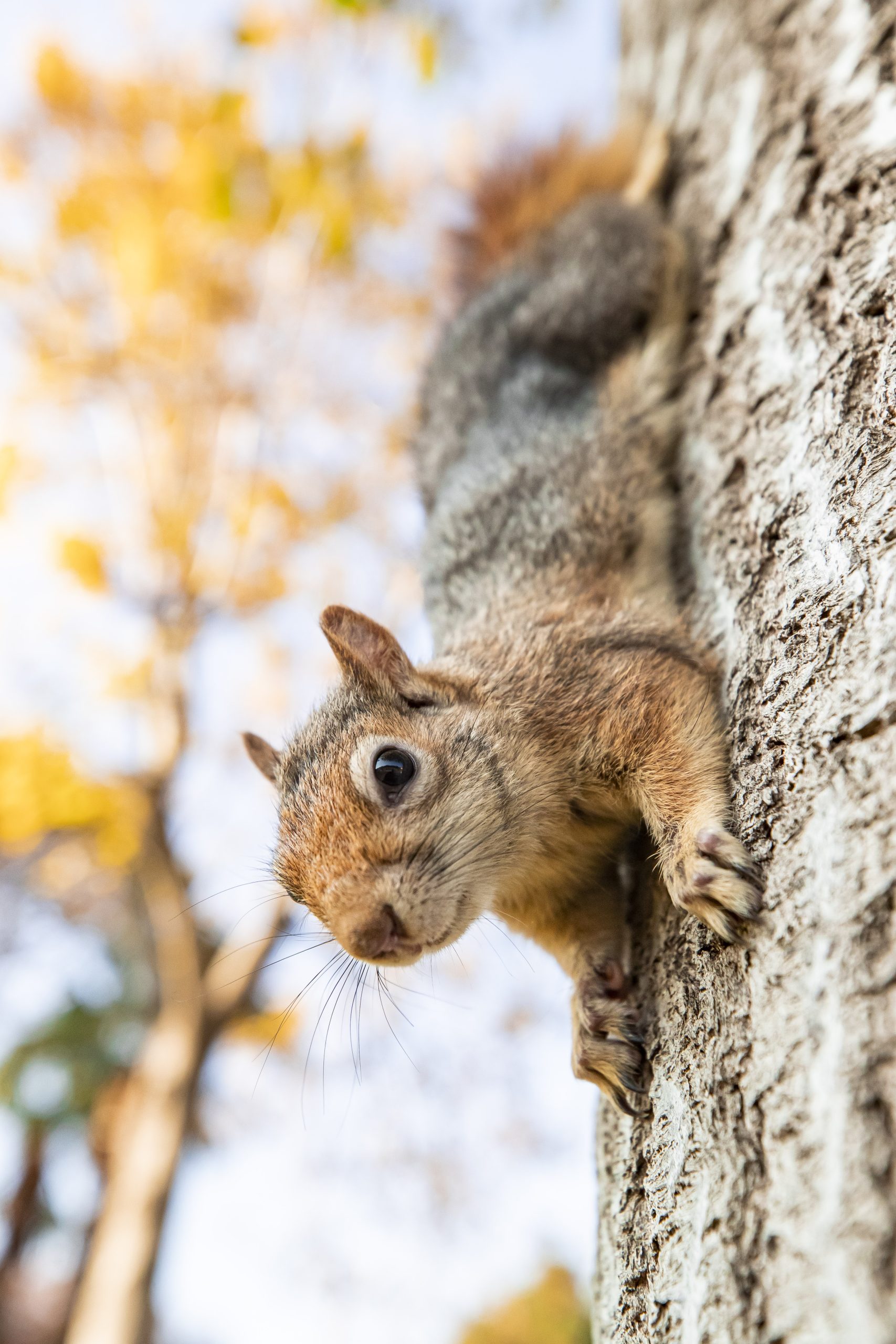expert squirrel removal services
Humane squirrel control and exclusion specialists protecting Metro Detroit homes from property damage and health hazards.
Squirrel Facts
Days active per year
Babies per year
year lifespan
Entry hole needed
Expert Squirrel removal services
Humane squirrel control and exclusion specialists protecting Metro Detroit homes from property damage and health hazards.
Squirrel Facts
Days active per year
Babies per year
year lifespan
entry hole needed
Why Squirrels Require Professional Removal
These intelligent, persistent rodents cause extensive property damage and create serious health risks that escalate quickly without professional intervention.
Electrical Fire Hazards
Squirrels instinctively chew to maintain teeth health, frequently targeting electrical wires. This behavior causes power outages and house fires, with squirrels responsible for 10-20% of all unexplained electrical fires.
Structural Damage
Create multiple entry points through soffits, fascia boards, and roof materials. Damage insulation, tear up ductwork, and modify structures to create nesting areas, resulting in thousands in repair costs.
Disease & Parasite Risk
Carry fleas, ticks, mites, and lice into homes. Droppings and urine contaminate insulation and living spaces, potentially transmitting salmonella, leptospirosis, and parasitic infections.

Rapid Reproduction
Produce 2-3 litters annually with 2-5 babies each. Baby squirrels mature quickly and often return to the same nesting area, creating generational infestations that multiply exponentially.
Noise & Sleep Disruption
Most active at dawn and dusk, creating scratching, scurrying, and chattering sounds. Running across roof surfaces and inside walls disrupts sleep and indicates active nesting behavior.
Food Storage & Attraction
Cache large quantities of nuts, seeds, and food items in attics and wall voids. Stored food attracts insects, secondary rodents, and creates foul odors when it spoils or decomposes.
Our Proven 6-Step Squirrel Control process
Systematic approach ensuring complete removal and long-term prevention.
Comprehensive Inspection
Thorough property assessment to identify entry points, nesting areas, damage extent, and family group size. We map squirrel activity patterns and travel routes.
Humane Removal
Live trapping using species-specific bait and placement strategies. We ensure mothers and babies stay together and use stress-reduction techniques during capture.
Complete Exclusion
Seal all entry points with squirrel-proof materials including heavy-gauge mesh, metal flashing, and expanding foam. Install one-way doors where needed for safe exit.
Damage Repair
Replace damaged insulation, repair chewed wires, and restore structural integrity. Address all modifications squirrels made to your property for nesting purposes.
Sanitization & Cleanup
Remove contaminated materials, clean droppings and urine, and apply hospital-grade disinfectants. Eliminate odors that could attract future squirrels.
Prevention Strategy
Install deterrents, trim tree branches, and implement landscape modifications to prevent future access. Ongoing monitoring and maintenance recommendations.
Why Choose Elite Wildlife Prevention?
Michigan’s most trusted squirrel removal specialists with proven results and comprehensive solutions.
Squirrel Behavior Experts
Specialized training in squirrel psychology, seasonal patterns, and exclusion techniques. Our team understands squirrel behavior better than general pest control companies.
Rapid Responses
Emergency squirrel removal available within hours. We know property damage escalates quickly, so our rapid response team is equipped and ready to deploy immediately.
Licensed & Fully Insured
Michigan state-licensed wildlife control professionals with comprehensive liability coverage. Our credentials ensure legal compliance and complete customer protection.
Human-First Approach
Live trapping and relocation methods that keep families together. We prioritize animal welfare while effectively solving your squirrel problem permanently.
satisfaction guaranteed
Your home deserves expert care. We guarantee safe, effective wildlife removal, and if you’re not satisfied, we’ll make it right—quickly and professionally.
Complete Property Protection
Beyond removal, we repair damage, replace insulation, and implement prevention strategies. Our comprehensive approach stops recurring infestations.
Common Squirrel Species in Michigan
Each species has unique behaviors and nesting preferences requiring specialized removal approaches.
Eastern Gray Squirrel
Most Common
Adaptable urban dwellers that prefer attics and wall voids. Excellent climbers with strong nesting instincts.
Year-round activity
2-3 litters annually
Excellent problem solvers
Strong territorial behavior
Red Squirrel
Most Aggressive
Highly territorial and vocal. Smaller but more aggressive than gray squirrels with intense nesting behavior.
Very territorial
Loud vocalizations
Aggressive defenders
Complex cache systems
Flying Squirrel
Nocturnal Species
Active at night, making detection difficult. Social species that nest in groups, creating larger infestations.
Nocturnal activity
Group nesting behavior
Gliding capabilities
Harder to detect
Fox Squirrel
Larger Species
Michigan’s largest tree squirrel. Less acrobatic but more destructive due to size and strength.
Slower but persistent
More ground activity
Stronger jaw and claws
Prefers larger entry points
Wayne County
Detroit, Dearborn, Westland, Canton, Plymouth, Livonia, Redford, Garden City, Lincoln Park, Wyandotte, Trenton, Southgate, Taylor, Romulus
Oakland County
Birmingham, Bloomfield Hills, Troy, Royal Oak, Ferndale, Pontiac, Auburn Hills, Rochester Hills, Southfield, Farmington Hills, Novi, West Bloomfield
Macomb County
Warren, Sterling Heights, Clinton Township, Macomb, Roseville, Eastpointe, St. Clair Shores, Mount Clemens, Chesterfield, New Baltimore
Local Expertise, Regional Coverage
As Metro Detroit natives, we understand local squirrel species and behavior patterns, seasonal movements, and the unique challenges of urban wildlife management in Michigan.
Our rapid response network ensures we can reach any location in our service area within hours, not days.
Local Expertise, Regional Coverage
As Metro Detroit natives, we understand local squirrel species and behavior patterns, seasonal movements, and the unique challenges of urban wildlife management in Michigan.
Our rapid response network ensures we can reach any location in our service area within hours, not days.
Wayne County
Detroit, Dearborn, Westland, Canton, Plymouth, Livonia, Redford, Garden City, Lincoln Park, Wyandotte, Trenton, Southgate, Taylor, Romulus
Oakland County
Birmingham, Bloomfield Hills, Troy, Royal Oak, Ferndale, Pontiac, Auburn Hills, Rochester Hills, Southfield, Farmington Hills, Novi, West Bloomfield
Macomb County
Warren, Sterling Heights, Clinton Township, Macomb, Roseville, Eastpointe, St. Clair Shores, Mount Clemens, Chesterfield, New Baltimore
Frequently Asked Questions
Common concerns about squirrel removal and prevention.

How do I know if I have squirrels or other rodents?
Squirrels are active during daylight hours (dawn and dusk), create larger droppings than mice, and make louder scratching/scurrying sounds. You may also hear chattering or barking vocalizations that mice and rats don’t make.
Can squirrels really cause house fires?
Yes. Squirrels are responsible for 10-20% of unexplained electrical fires. Their constant need to chew leads them to electrical wires, which can cause shorts, power outages, and fires. This makes professional removal urgent for safety reasons.
How much does squirrel removal cost?
Squirrel removal typically costs $300-$1,000 depending on infestation size, damage extent, and number of entry points. We provide free inspections and detailed estimates before any work begins.
When is squirrel activity the highest?
Spring and fall are peak seasons when squirrels seek nesting sites and cache food for winter. However, squirrels are active year-round in heated spaces like attics, making professional removal necessary regardless of season.
Will squirrels leave on their own?
No. Once squirrels establish a nesting site, they typically return year after year and often bring offspring. The longer you wait, the more damage occurs and the larger the population becomes.
How do you prevent squirrels from returning?
Complete exclusion involves sealing all entry points with squirrel-proof materials, trimming tree branches away from structures, installing deterrents, and removing attractants like accessible food sources.
Is it legal to trap and relocate squirrels in michigan?
Yes, but proper permits and methods must be followed. Licensed professionals ensure compliance with state regulations regarding trapping, relocation distances, and timing restrictions.
What should I do if I find baby squirrels?
Never attempt to handle baby squirrels yourself. Contact professionals immediately. We use specialized techniques to keep mothers and babies together during removal, ensuring the survival of the family unit.

How do I know if I have squirrels or other rodents?
Squirrels are active during daylight hours (dawn and dusk), create larger droppings than mice, and make louder scratching/scurrying sounds. You may also hear chattering or barking vocalizations that mice and rats don’t make.
Can squirrels really cause house fires?
Yes. Squirrels are responsible for 10-20% of unexplained electrical fires. Their constant need to chew leads them to electrical wires, which can cause shorts, power outages, and fires. This makes professional removal urgent for safety reasons.
How much does squirrel removal cost?
Squirrel removal typically costs $300-$1,000 depending on infestation size, damage extent, and number of entry points. We provide free inspections and detailed estimates before any work begins.
When is squirrel activity the highest?
Spring and fall are peak seasons when squirrels seek nesting sites and cache food for winter. However, squirrels are active year-round in heated spaces like attics, making professional removal necessary regardless of season.
Will squirrels leave on thier own?
No. Once squirrels establish a nesting site, they typically return year after year and often bring offspring. The longer you wait, the more damage occurs and the larger the population becomes.
How do you prevent squirrels from returning?
Complete exclusion involves sealing all entry points with squirrel-proof materials, trimming tree branches away from structures, installing deterrents, and removing attractants like accessible food sources.
Is it legal to trap and relocate squirrels in michigan?
Yes, but proper permits and methods must be followed. Licensed professionals ensure compliance with state regulations regarding trapping, relocation distances, and timing restrictions.
What should I do if I find baby squirrels?
Never attempt to handle baby squirrels yourself. Contact professionals immediately. We use specialized techniques to keep mothers and babies together during removal, ensuring the survival of the family unit.
licensed & insured| humane methods | satisfaction guaranteed
Stop Squirrel Damage Before it Escalates
Professional squirrel removal protects your property, family, and prevents costly structural damage

